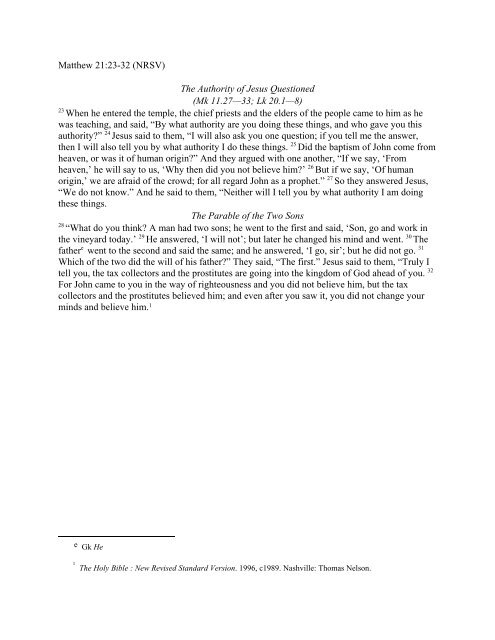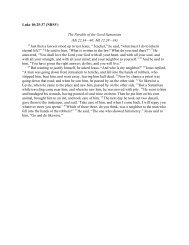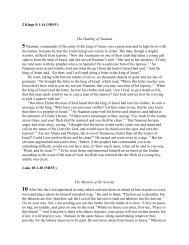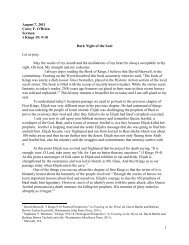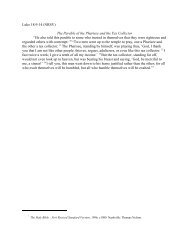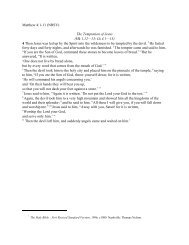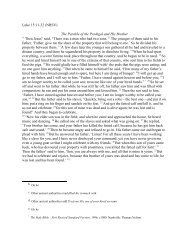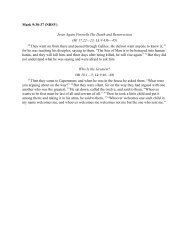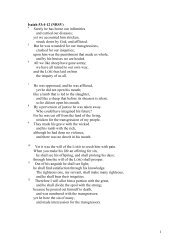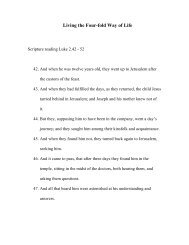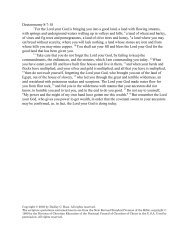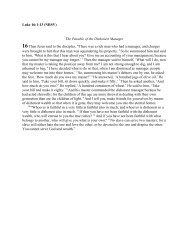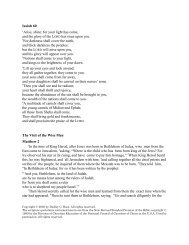Matthew 21:23-32 (NRSV) The Authority of Jesus Questioned (Mk ...
Matthew 21:23-32 (NRSV) The Authority of Jesus Questioned (Mk ...
Matthew 21:23-32 (NRSV) The Authority of Jesus Questioned (Mk ...
You also want an ePaper? Increase the reach of your titles
YUMPU automatically turns print PDFs into web optimized ePapers that Google loves.
<strong>Matthew</strong> <strong>21</strong>:<strong>23</strong>-<strong>32</strong> (<strong>NRSV</strong>)<br />
<strong>The</strong> <strong>Authority</strong> <strong>of</strong> <strong>Jesus</strong> <strong>Questioned</strong><br />
(<strong>Mk</strong> 11.27—33; Lk 20.1—8)<br />
<strong>23</strong><br />
When he entered the temple, the chief priests and the elders <strong>of</strong> the people came to him as he<br />
was teaching, and said, “By what authority are you doing these things, and who gave you this<br />
authority” 24 <strong>Jesus</strong> said to them, “I will also ask you one question; if you tell me the answer,<br />
then I will also tell you by what authority I do these things. 25 Did the baptism <strong>of</strong> John come from<br />
heaven, or was it <strong>of</strong> human origin” And they argued with one another, “If we say, ‘From<br />
heaven,’ he will say to us, ‘Why then did you not believe him’ 26 But if we say, ‘Of human<br />
origin,’ we are afraid <strong>of</strong> the crowd; for all regard John as a prophet.” 27 So they answered <strong>Jesus</strong>,<br />
“We do not know.” And he said to them, “Neither will I tell you by what authority I am doing<br />
these things.<br />
<strong>The</strong> Parable <strong>of</strong> the Two Sons<br />
28<br />
“What do you think A man had two sons; he went to the first and said, ‘Son, go and work in<br />
the vineyard today.’ 29 He answered, ‘I will not’; but later he changed his mind and went. 30 <strong>The</strong><br />
father e went to the second and said the same; and he answered, ‘I go, sir’; but he did not go. 31<br />
Which <strong>of</strong> the two did the will <strong>of</strong> his father” <strong>The</strong>y said, “<strong>The</strong> first.” <strong>Jesus</strong> said to them, “Truly I<br />
tell you, the tax collectors and the prostitutes are going into the kingdom <strong>of</strong> God ahead <strong>of</strong> you. <strong>32</strong><br />
For John came to you in the way <strong>of</strong> righteousness and you did not believe him, but the tax<br />
collectors and the prostitutes believed him; and even after you saw it, you did not change your<br />
minds and believe him. 1<br />
e Gk He<br />
1<br />
<strong>The</strong> Holy Bible : New Revised Standard Version. 1996, c1989. Nashville: Thomas Nelson.
Playing Games with the Kingdom <strong>of</strong> God<br />
A sermon preached at North-Prospect United Church <strong>of</strong> Christ, Cambridge, Massachusetts<br />
Date: September 25, 2005<br />
Rev. Dudley C. Rose<br />
Text: <strong>Matthew</strong> <strong>21</strong>:<strong>23</strong>-<strong>32</strong><br />
<strong>The</strong> sermon was interesting. It was full <strong>of</strong> striking sentences. <strong>The</strong>y would have<br />
commanded attention printed. Spoken with the passion <strong>of</strong> a dramatic utterance that had the good<br />
taste never to <strong>of</strong>fend with a suspicion <strong>of</strong> ranting or declamation, they were very effective. If the<br />
Rev. Henry Maxwell that morning felt satisfied with the conditions <strong>of</strong> his pastorate, the First<br />
Church also had a similar feeling as it congratulated itself on the presence in the pulpit <strong>of</strong> this<br />
scholarly, refined, somewhat striking face and figure, preaching with such animation and<br />
freedom from all vulgar, noisy or disagreeable mannerism.<br />
Suddenly, into the midst <strong>of</strong> this perfect accord and concord between preacher and<br />
audience, there came a very remarkable interruption. It would be difficult to indicate the extent<br />
<strong>of</strong> the shock which this interruption measured. It was so unexpected, so entirely contrary to any<br />
thought <strong>of</strong> any person present that it <strong>of</strong>fered no room for argument or, for the time being, <strong>of</strong><br />
resistance.<br />
<strong>The</strong> sermon had come to a close. Mr. Maxwell had just turned the half <strong>of</strong> the big Bible<br />
over upon his manuscript and was about to sit down as the quartet prepared to arise to sing the<br />
closing selection,<br />
"All for <strong>Jesus</strong>, all for <strong>Jesus</strong>,<br />
All my being's ransomed powers,..."<br />
when the entire congregation was startled by the sound <strong>of</strong> a man's voice. It came from the rear <strong>of</strong><br />
the church, from one <strong>of</strong> the seats under the gallery. <strong>The</strong> next moment the figure <strong>of</strong> a man came<br />
out <strong>of</strong> the shadow there and walked down the middle aisle. Before the startled congregation<br />
fairly realized what was going on the man had reached the open space in front <strong>of</strong> the pulpit and<br />
had turned about facing the people.<br />
…<br />
"I'm not an ordinary tramp, though I don't know <strong>of</strong> any teaching <strong>of</strong> <strong>Jesus</strong> that makes one<br />
kind <strong>of</strong> a tramp less worth saving than another. Do you" He put the question as naturally as if<br />
the whole congregation had been a small Bible class. He paused just a moment and coughed<br />
painfully. <strong>The</strong>n he went on.<br />
…<br />
<strong>The</strong>re are a good many others like me. I'm not complaining, am I Just stating facts. But I<br />
was wondering as I sat there under the gallery, if what you call following <strong>Jesus</strong> is the same thing<br />
as what He taught. What did He mean when He said: 'Follow Me!' <strong>The</strong> minister said," -- here he<br />
turned about and looked up at the pulpit -- "that it is necessary for the disciple <strong>of</strong> <strong>Jesus</strong> to follow<br />
His steps, and he said the steps are 'obedience, faith, love and imitation.' But I did not hear him<br />
tell you just what he meant that to mean, especially the last step. What do you Christians mean<br />
1
y following the steps <strong>of</strong> <strong>Jesus</strong> 2<br />
<strong>The</strong>se words, taken from the early pages <strong>of</strong> Charles M. Sheldon’s late nineteenth-century<br />
novel, In His Steps, ask the question, What does it mean to follow in the steps <strong>of</strong> <strong>Jesus</strong> And the<br />
implication is that whatever the answer to that question is, it is not being done at First Church <strong>of</strong><br />
Raymond, where the Rev. Henry Maxwell is the preacher. Despite fine preaching and beautiful<br />
music, we get the idea that First Church in Raymond has missed the mark.<br />
Of course, what Sheldon put his finger on casts a net far beyond the fictional First<br />
Church <strong>of</strong> Raymond. <strong>The</strong> great irony is that religious institutions and religious leaders more<br />
<strong>of</strong>ten than not become exactly the opposite <strong>of</strong> what their religious beliefs would try to make <strong>of</strong><br />
them. Along the way it becomes rather amazing to witness the mental and theological<br />
contortions that people will perform to give religious credibility to the most ungodly things. It is<br />
stunning that there seems so little embarrassment when the God <strong>of</strong> love is used to hate, when the<br />
God <strong>of</strong> peace is used to justify war, when the God <strong>of</strong> compassion is used to justify meanspiritedness,<br />
when the God who ate with the poor is used to justify the rich, when the God who<br />
included all at the banquet is used to exclude so many in his name.<br />
In this morning’s scripture we are reminded that religious institutions and people have for<br />
a very long time had the habit <strong>of</strong> leaving their religious principles to gather dust.<br />
In the story <strong>of</strong> <strong>Jesus</strong>, this morning’s passage places us near the end. He has entered<br />
Jerusalem for that last fateful week <strong>of</strong> his life. He has brought his message to the central symbol<br />
<strong>of</strong> religious practice and belief in Judea. He has come to the Temple in Jerusalem to teach his<br />
message. And while he is there, the religious leaders, the chief priests and the elders approach<br />
him. <strong>The</strong>y see him as a trespasser, someone who doesn’t belong there. Like the tramp in<br />
Sheldon’s novel, <strong>Jesus</strong> is out <strong>of</strong> place. <strong>Jesus</strong> is always out <strong>of</strong> place. He’s born out back in a<br />
shed, not in a warm clean room in the inn. He tells those who would follow him that he has no<br />
place to lay his head. He has to borrow a donkey and a room when he comes to Jerusalem. He’s<br />
not comfortable to have around.<br />
And so the priests and the elders come up to him and ask him, “By what authority are you<br />
doing these things, and who gave you this authority” Make no mistake here. <strong>The</strong> priests and<br />
the elders are asking a pedestrian question, not a l<strong>of</strong>ty one. <strong>The</strong>y are asking, Who let you in<br />
Who said you could be here Who gave you the keys <strong>The</strong>y are asking, Do you have any<br />
credentials to be here Are you a priest Are you an elder Are you ordained Has anyone<br />
given you a mark <strong>of</strong> approval.<br />
<strong>Jesus</strong> knows the question they are asking, and he knows that it’s not the right question,<br />
either. A battle <strong>of</strong> authority, when authority means who in authority gave you permission, is a<br />
battle he cannot win, and he knows that it’s a battle not worth fighting, either.<br />
So <strong>Jesus</strong> shifts the ground. He says, First, let me ask you a question. Did the baptism <strong>of</strong><br />
John come from heaven, or was it <strong>of</strong> human origin” <strong>Jesus</strong> changes the framework, and he raises<br />
the stakes. He asks the priests and elders to weigh in on a different kind <strong>of</strong> authority. He asks<br />
them to tell him if they think that John the Baptist baptized with heavenly authority or human<br />
2<br />
From Charles M. Sheldon, In His Steps, chapter 1. This book was never properly copyrighted<br />
in 1896 when it was serialized, so it was immediately in the public domain. It has been<br />
published by numerous publishers, translated into several languages, and has been said to have<br />
sold more copies than any other book save the Bible.<br />
2
authority. He moves the question from Who gave you permission to Who is actually following<br />
what God stands for He shifts the discussion from building security (Who said you can be in<br />
here) to the real issue (Is what John did and said true And by implication, Is what I’m doing<br />
here true).<br />
<strong>The</strong> priests and the elders step aside and hold a caucus. If the stake for <strong>Jesus</strong> is the<br />
kingdom <strong>of</strong> God, for the priests and the elders it is but a game they are trying to win. <strong>The</strong>y say<br />
to themselves, We’ve got to be careful here. This is a Catch-22. If we say that John baptized<br />
with heavenly authority, he’s going to ask us why we rejected him and why we let him be<br />
executed. But if we say that John baptized with only human authority, we’re going to have a<br />
problem with the crowd, because they think he was a prophet. Let’s just say we don’t know.<br />
That’s our safest bet.<br />
It reminds you a lot <strong>of</strong> the recent hearings on John Roberts, nominee for Chief Justice <strong>of</strong><br />
the Supreme Court. A journalist summarized the Roberts strategy this way. He said, “Karl Rove<br />
took John Roberts out back and showed him the chalk outline <strong>of</strong> former Supreme Court nominee<br />
Robert Bork laying on the sidewalk. Rove told Roberts, you can be like Bork if you want. You<br />
can have a catharsis and tell people what you really think about important things. And if you do,<br />
you’ll be laying there just like him, dead. Or you can shut up and win confirmation.”<br />
<strong>The</strong> priests and the elders took the John Roberts approach. <strong>The</strong>y said, “Well, actually,<br />
we don’t know where John the Baptist got his authority.”<br />
<strong>The</strong>re are lessons here, lessons that in some ways would seem to vindicate the Karl Rove<br />
approach. <strong>Jesus</strong> bested the priests and elders in this interchange. <strong>The</strong>y took a pass on the real<br />
conversation. <strong>Jesus</strong> clearly comes <strong>of</strong>f the best in the interchange. And yet, within the week,<br />
these priests and elders will be a party to <strong>Jesus</strong>’ condemnation to death. Within the week, they<br />
will participate in his crucifixion. Within the week, they will win, and <strong>Jesus</strong> will lose. <strong>The</strong><br />
strategy <strong>of</strong> remaining squarely in the earthly and human realm, the strategy <strong>of</strong> avoiding the real<br />
questions, <strong>of</strong>ten seems to pay<strong>of</strong>f. It is certainly a tried and true strategy. And its ramifications<br />
are far from trivial.<br />
In January 1933 Adolf Hitler was named chancellor <strong>of</strong> Germany. On April 7th <strong>of</strong> the<br />
same year, Hitler passed the Aryan Civil Service legislation that prohibited those <strong>of</strong> Jewish<br />
descent, irrespective <strong>of</strong> their current religious affiliation, from holding <strong>of</strong>fices in the state or in<br />
the church. It was but the beginning <strong>of</strong> what would become perhaps the largest scale human<br />
tragedy in history. Even though from heaven’s view the un-Christian-ness <strong>of</strong> it all was obvious,<br />
only a few in the Christian church thought there was a problem. Most <strong>of</strong> them rallied around the<br />
idea that the realm <strong>of</strong> God and the realm <strong>of</strong> the Third Reich were compatible. More than<br />
compatible, they were seen to be the same thing. <strong>The</strong> young theologian Dietrich Bonhoeffer was<br />
one <strong>of</strong> the few who thought the idea was dead wrong. In the summer <strong>of</strong> that same year, 1933, at<br />
the University <strong>of</strong> Berlin Bonhoeffer lectured on the meaning <strong>of</strong> Christ, and there in a pointed<br />
reference to the directions his homeland was taking he noted, “Christ goes through the ages,<br />
questioned anew, misunderstood anew, and again and again put to death.” 3 To Bonhoeffer it<br />
wasn’t just that Christ wasn’t on the same page as the human and political realm, he was put to<br />
death by the human and political realm. After twelve years <strong>of</strong> resistance, on April 9, 1945 at the<br />
3 A Testament to Freedom, Dietrich Bonhoeffer, edited by Geffrey B. Kelly and F. Burton<br />
Nelson. HarperSanFrancisco, 1990, 1995. 114.<br />
3
Flossenbürg concentration camp, less than a month before Germany’s surrender, Bonhoeffer,<br />
along with other key figures in the resistance, was himself executed, executed largely because,<br />
like <strong>Jesus</strong>, he insisted on living his life from the perspective <strong>of</strong> heavenly authority.<br />
So, where has this brought us this morning Has your pastor found the ultimate tool <strong>of</strong><br />
Christian evangelism: Follow <strong>Jesus</strong>, it’ll cost you your life History says there may,<br />
unfortunately, be some truth to that. Elsewhere <strong>Jesus</strong> addresses this issue himself.<br />
Mark 8:35-37 (NASB95) “For whoever wishes to save his life will lose it, but whoever<br />
loses his life for My sake and the gospel’s will save it. For what does it pr<strong>of</strong>it a man to gain the<br />
whole world, and forfeit his soul For what will a man give in exchange for his soul”<br />
<strong>The</strong> point, however, is not martyrdom. Fortunately, only in extreme cases does following<br />
<strong>Jesus</strong> end in death. But very <strong>of</strong>ten, because to follow <strong>Jesus</strong> means to insist on a heavenly<br />
yardstick, it does mean running against the powers and principalities <strong>of</strong> this world. And it can be<br />
particularly confusing because very <strong>of</strong>ten, as in the interchange in this morning’s scripture, as in<br />
the Weimar Republic, as in the First Church in Raymond, and, quite dangerously, as in this<br />
country today, the realm <strong>of</strong> religion joins forces with the realm <strong>of</strong> the powers and principalities,<br />
and together they let the most ungodly perspectives masquerade as the word <strong>of</strong> God.<br />
Sometimes siding with the heavenly realm can be deadly, as it was for Dietrich<br />
Bonhoeffer. But his life was not in vain. Today, on the Römerberg in the center plaza <strong>of</strong><br />
Frankfurt there is a plaque on the spot where in 1933 the books were burned. Because <strong>of</strong> people<br />
like Bonhoeffer the plaque confesses the sins <strong>of</strong> the past, and it stands as a constant reminder <strong>of</strong><br />
the difference between heavenly and human authority. Amen.<br />
Copyright © 2005 by Dudley C. Rose. All rights reserved.<br />
4


